#this is not so much literary analysis
Text
I made the mistake of going through the recent #Faith Seed posts, and now we all have to suffer for it.
I blame the lack of multifaceted female or femme antagonists for this, but why is it that we all have such a hard time doing away with the Madonna/Whore or Mary/Eve dycotomy? Why is it that we allow ourselves to peel back the layers of contradicting traits that a male antagonist gets wrapped in, but we have to grit our teeth to do the same with their female counterparts?
Hell, I'm still struggling with this myself, and more so in the case of Rachel who is supposed to embody this dycotomy, The Mother of the cult and the Serpent tempting anyone who enters the Garden. So I'm sympathetic to the limited charitability we give her, but am also aware we spoil the male antagonists with it.
Shit, it's easy to see how John lies to himself and the audience about his convictions, to see him hide his doubt from the older brother he so admires. Yet we choose to look the other way when Faith screams about fearing what that older man she is trying to get you to worship, the older man her life revolves around, is going to do to her?
Again, I believe that growing up with media filled with male characters and not enough female characters in different narrative roles is to blame, at least in part. And at least in my case.
#far cry 5#faith seed#this is not so much literary analysis#as it is me talking myself out of learned behaviors#AKA talking TO myself
15 notes
·
View notes
Text
(i feel like analyzing stuff again so here we go) kaz is smart because he knows people. he loves puzzles, loves locks, loves taking things apart to figure out how they work. he says in soc that you figure people out like you figure anything else out, by taking it apart. kaz is smart because he finds enough out about people to make assumptions.
he knows what people will do, and often times it leaves the ones being duped going "how did he do that? how did he know?" kaz never truely knows something will 100% happen, he's just assuming it will and is almost always right.
in the begining of soc, when the crows are breaking matthias out of hellgate, kaz assumes wrong, though. he knows that jesper has a reputation for being late, so he assumes that jesper will take to the task of releasing the animals like he will anything else he does, and be late doing it. he has, in some sense, taken jesper apart. he knows what jesper does, and he plans around this assumption, however ends up being wrong. nothing extremely consequential happens because of his assumption, but it proves that kaz will assume things with confidence.
a huge aspect to why kaz is so successful in his planning and overall schemes is because he knows how to make a good assumption. he has inej gathering him intel, which enables him to make such confident and correct guesses about how people will act.
one instance of kaz's assumptions being correct is the whole geels and 19 burstraat situation in the beginning of soc. when kaz threatens to burn down geels' lover's home, geels could have not cared, could have shot kaz right there, but he didn't. geels doesn't, and kaz continues very boldly facing him. why? because kaz knows how geels will act.
another instance is in ck when kaz kidnaps alys and uses her to get inej back. at this point, kaz knows how van eck will act. van eck has already duped kaz once, and i imagine after this one of the things kaz does to insure it never happens again is over analyzing and taking him apart. it works in this instance, because kaz has already seen how much van eck cares about a "worthy heir," and alys is literally holding that. kaz has taken van eck apart, and had figured him out enough to make a bold and correct act based on assumption.
all this to say, kaz thinks and thinks and thinks and is always thinking and picking everything apart, and that is the key to why he can get away with everything he does. and maybe one day his assumptions that make him so smart will fail him, and maybe one day they'll be fatally wrong.
#i'm back at it again with the literary analysis#my english teacher loves me#weird statement but yk what i mean#i feel like (and know) that i'm constantly picking apart this duology and i don't think i'll stop anytime soon#i could yap forever but i'll stop for y'all's sake#UGH i just love kaz's character so much#so COMPLEX and so much to ANALYZE#kaz brekker#side note yall i've been spelling brekker like brekkar for the longest time and no one was gonna TELL ME???#kazzle dazzle#six of crows#literary analysis#yapping#yapping fr#six of crows fandom#soc
109 notes
·
View notes
Text
youtube
Watch the 2024 American Climate Leadership Awards for High School Students now: https://youtu.be/5C-bb9PoRLc
The recording is now available on ecoAmerica's YouTube channel for viewers to be inspired by student climate leaders! Join Aishah-Nyeta Brown & Jerome Foster II and be inspired by student climate leaders as we recognize the High School Student finalists. Watch now to find out which student received the $25,000 grand prize and top recognition!
#ACLA24#ACLA24HighSchoolStudents#youtube#youtube video#climate leaders#climate solutions#climate action#climate and environment#climate#climate change#climate and health#climate blog#climate justice#climate news#weather and climate#environmental news#environment#environmental awareness#environment and health#environmental#environmental issues#environmental education#environmental justice#environmental protection#environmental health#high school students#high school#youth#youth of america#school
17K notes
·
View notes
Text
Interpreting Bilbo’s Speech
As an editor whose job requires the ability to untangle confusing sentences, I maintain that Bilbo’s speech at his 111th birthday party was actually genuine and complimentary. Let’s break this down.
“Alas, eleventy-one years is far too short a time to live among such excellent and admirable hobbits. I don't know half of you half as well as I should like, and I like less than half of you half as well as you deserve."
“I don’t know half of you as well as I should like” can be translated as “Half of you are people I don’t know as well as I wish I did. I wish I knew you at least half again as much as I do.” Literally, “I wish I’d gotten to know you better.”
“I like less than half of you half as well as you deserve.” He may not have a deep affection for this less-than-50% of the party-goers, but he acknowledges that they deserve twice as much respect and appreciation as what he gave them during their acquaintance. Literally, “I know there’s more to be appreciated about you than I knew of or that I am capable of appreciating.”
Note: Since he clearly knows THIS half well enough to know they deserve more of his respect and affection than what he gave them, we are probably safe to presume that they are the opposite half from the first group, who he wishes he had gotten to know better. (Although there is probably some crossover). (This part gets into Math a little bit, which is NOT my specialty as an editor.)
So, if we take his first sentence literally—“Alas, eleventy-one years is far too short a time to live among such excellent and admirable hobbits”—then the whole statement is actually quite genuine. For all his grumbling and muttering about his various neighbors’ and relations’ failings or annoyances, Bilbo really does respect and admire many of them, and he is wise enough to know that there’s more to appreciate in the people he doesn’t care for or didn’t know well than he has managed to discover in his short lifetime with them.
But of course this is Bilbo, so he wrapped it up in a mind-bending riddle and left everyone wondering if they’d been insulted before he abruptly vanished, leaving the party in chaos.
In conclusion: Bilbo’s way of handling the awkwardness of being sincere to a large group of people involves tying his compliments into a knot and then running away forever while they’re distracted untangling it.
I’m not saying this is the healthiest way of dealing with the mortifying ordeal of being known, but it does feel very Bilbo.
#lotr#the hobbit#bilbo baggins#literary analysis#movie analysis#I can't remember if this speech is in the books or not#but anyway#I also know he's much better at sharing his feelings with close friends#so this is probably mostly because he was talking to a huge crowd of people he didn't know as well as his close personal friends#and because he's a tricksy little hobbit#anyway my logic might miss a couple points so feel free to point out your own interpretations!#it was definitely a confusing speech XD
373 notes
·
View notes
Text
POV: You are a pirate who has captured 19-year-old Julius Caesar. He got offended by how low the ransom you asked for him was, and told you to double it. This is probably the only reason you haven't killed him yet, because he insists on making you listen to his lawyer speeches and bad poetry in the meantime.

Plutarch, Life of C. Caesar, 2.
#i love the pirate story so much as a piece of writing#i could write a whole literary analysis of just this passage and how it's so well done#julius caesar#pirates#jlrrt reads#plutarch#just roman memes
67 notes
·
View notes
Text
Okay so, I wanna preface this by saying that I have not read Sanderson’s other books so this is not a discussion about his actual abilities as a writer, and I’m not saying that he’s in anyway a bad writer. I do not envy the situation he was in At All, it must’ve been incredibly difficult to be given the responsibility of finishing such a long and beloved story as Wheel of Time. Trying to honor RJ’s story and characters when you are jumping in at the climax and expected to finish it in a way that the fans find satisfying when there is no way to make Every fan happy with the ending. Okay with that out of the way let’s talk.
So i have a lot of feelings about the final three books of Wheel of Time. There were many parts I enjoyed and there were also parts I was disappointed by. Personally, I felt like many aspects of the last three books felt rushed and incomplete and the pacing a bit odd in places and a lot of that comes down to the fact that it was originally meant to be one giant book, but like- that would’ve been ridiculous and I agree with the choice to break it up into multiple books. However I honestly think they should’ve just broke it up into more than three books to properly to pace them. There were a lot of things that Needed to happen that I think ended up causing certain things to get cut, for instance I do believe a big portion of both Mat and Min’s storylines in those last books were cut for time, specifically I think there was probably originally a lot more time dedicated to dealing with the Seanchen. What I believe to have happened is that Sanderson was given the notes about where the Black Tower needed to be and decided to dedicate the time to it and in exchange he cut the Seanchen plot line for pacing since the Seanchen were Technically already solved. Technically. Now controversial opinion but I did actually like Androl, however, I think he and the rest of the Black Tower suffered from having their storyline rushed. The plot line in the black tower should’ve started after the Ashaman with Rand betrayed them as we got to see the corruption already seeping into the Black Tower. Sadly that’s not what we got, but it honestly deserved an entire book to properly introduce it and it would’ve benefited from having pre-established characters that we cared about be more involved. Other parts of the story I think deserved more time dedicated to, the actual process of stealing the horn of Valere back from the White Tower, I wanted a heist mission with Faile and the Band but that is just personal preference lol. More time learning about Slayer and the red veiled Aiel, they were introduced and then promptly stopped actually mattering outside of being enemy fodder. Literally everything about Faine and the Evil of Shadar Logoth, Faine dying so quickly will forever disappoint me, he was a main antagonist since book one and his death felt very quick and unceremonious, like just tying up loose ends.
Next is issues with characterization. Once again I do not envy Sanderson’s job here at all. This type of thing isn’t easy but I can also see exactly where the issues were. Sanderson by his own admission didn’t understand Mat, and he Did get better at writing him but the damage was already done unfortunately and there wasn’t enough time to properly fix the issues with Mat’s characterization. Mat was not the only character whose characterization was flattened however, Aviendha and Tuon for instance also lacked a lot of their original nuance. I think it’s very clear where Sanderson struggled and that is with unreliable narrators. Characters that Sanderson seems to both enjoy the most and successfully write in a compelling way are characters who very straight forward and honest, their internal monologue matches their actions, and they reliably narrate their stories. Characters like Perrin and Galad thrived under Sanderson’s writing style. Androl is a very obvious example of this archetype being one that he’s comfortable writing. The issue he faced with both Mat and Tuon is that their unreliable narrators who act inconsistently to an outsider perspective and I think for Mat especially Sanderson struggled to get past his first impression of Mat. The biggest issue with Sanderson’s version of Mat is that his character arc was reset, Sanderson’s Mat was still running away from his destiny and trying to avoid Rand, something Mat had already worked past in books four and five with Melindra and the Rhavin incident teaching him to accept his destiny and embrace his role as Rand’s General. This meant that Mat and Tuon’s relationship lost a large part of its nuance and Mat’s actions felt out of character and immature for the point in the story we reached. There’s also the difference in how RJ wrote Mat’s “flirtatious play boy” status versus how Sanderson portrays it and it can feel a bit jarring at times, and just in general, I feel like Sanderson often wrote Mat as “stupid” where he very much isn’t. He’s reckless and mischievous but never stupid and I think Sanderson equated his recklessness with stupidity in some places.
Writers play favorites, and it does show, RJ’s favorite was Mat and Sanderson’s favorite was Perrin and both are very obvious preferences. Poor Rand was neither writers favorite but it’s okay because as the protagonist he at least got consistent page time dedicated to him. RJ definitely paid more attention to Mat than Perrin and Sanderson did vice versa. So I’m not complaining just because I wanted Mat to get more page time. My issues with it are that Mat ended up feeling a bit underwhelming during the last battle. Where all other characters got to have their spotlight moment during a Memory of Light, Mat didn’t; and perhaps that’s because Towers of Midnight was originally part of a Memory of Light so Mat had got his big moment in the final book during the original draft. The Seanchen overall felt like it was resolved in an underwhelming manner, as did the Shadar Logoth plot line and it just so happens that both of those plot lines were Mat’s and I do think Sanderson’s bias informed his decision at least subconsciously when choosing which storylines to trim down.
In summary I would’ve rather Sanderson made it five more whole books if it meant that all the plot lines could be given enough time to be resolved in a fully satisfactory way.
#wheel of time#wheel of time spoilers#wot meta#wot book spoilers#brandon sanderson wot books#literary analysis my beloved#I love this book series so much#I really wish I could’ve read the finale that RJ would’ve written
57 notes
·
View notes
Text
i am SO pissed abt the whole 'sophie letting alvar go' thing. that had the potential to be such a good arc for her character and fitz's, but shannon made it seem like she was in the right. she wasn't. that was not her choice to make.
sophie is a character that has stayed relatively the same throughout the series. she is in desperate need of an arc and this event could have triggered it. i understand why she did it but i'm annoyed that shannon made it seem like fitz was in the wrong for being angry about it.
shannon tries to create a 3D character with 'flaws' but none of her flaws seem to impact the overarching plot at all. shannon has her favourites (keefe and sophie) and she is afraid of ever putting them in the wrong.
keefe has almost never been held accountable for his admittedly flawed actions- and for him to be a complex and deep character like shannon so clearly wants him to be he needs to have flaws. his actions cannot be excused by his love for sophie. that is a (bad) explanation not an excuse.
shannon needs to stop using characters like fitz and stina as her own personal punching bag and start adding more nuances to her main characters.
my problem with the series is that shannon has created tropes and figureheads instead of realistic human beings, and when she does occasionally create real characters the narrative faults them for it. they are always in the wrong for understandable and pretty much right reactions to things that are wrong. i love sophie and keefe, dont get me wrong, but they are too focused on. by focusing only on sophie and keefe, she has rid them of their flaws and made them pretty boring, making her 'hated' characters far more interesting by comparison. let them make the mistakes. let there be consequences. let sophie and keefe be messy and imperfect and flawed. please please please shannon i am begging you give your characters some actual character
#also canon keefe has barely any motivation besides sophie??#this is just reverse bella and edward#i love them all so so much but for the love of god#kotlc#keeper of the lost cities#kotlc crit#blue analyses things#literary analysis#sokeefe#shannon messenger
32 notes
·
View notes
Text
youtube
Watch the American Climate Leadership Awards 2024 now: https://youtu.be/bWiW4Rp8vF0?feature=shared
The American Climate Leadership Awards 2024 broadcast recording is now available on ecoAmerica's YouTube channel for viewers to be inspired by active climate leaders. Watch to find out which finalist received the $50,000 grand prize! Hosted by Vanessa Hauc and featuring Bill McKibben and Katharine Hayhoe!
#ACLA24#ACLA24Leaders#youtube#youtube video#climate leaders#climate solutions#climate action#climate and environment#climate#climate change#climate and health#climate blog#climate justice#climate news#weather and climate#environmental news#environment#environmental awareness#environment and health#environmental#environmental issues#environmental justice#environment protection#environmental health#Youtube
17K notes
·
View notes
Note
Alright wise guy, what are your thoughts on the theme(s) of the first Mistborn book. This is literally an excuse for you to ramble about it, have fun.
VOID I LOVE YOU SM
So spoilers for Mistborn: The Final Empire! If you haven't read it, please beware because under the cut, Here There Be Spoilers
(and also beware, Very Long post under the cut!)
The big running theme in The Final Empire is trust. Who can one really trust? Is it worth it to put your life in the hands of other people? What says they won't betray you as soon as it becomes favorable to do so?
Honestly this really is what Vin's character arc in the first book is about. At the beginning of the book, she's trapped in a low-level street gang where everyone is always out to get everyone else. Heck, the second time the audience ever sees her use her powers is when she is helping her boss betray a business partner.
Vin's brother has beaten into her the idea that she can trust nobody, not even him. Everyone is always out to hurt her or take advantage of her, and if she does not prove her immediate worth to her group, then at best she will be kicked out.
This, of course, is not helped by the fact that she is part of the literal slave class! Which is a whole nother essay tbh.
Then Kelsier takes her in and everything changes. There's a scene early on in the book, after vin formally joins the crew, where Kelsier and his men are all laughing and enjoying themselves while plotting their Big Plan™. And Vin, who does not trust any of them, is on the outside, quite literally. She's outside the room, watching them plan, wishing she could be included but not allowing herself to, because at this point in the book she still thinks they could betray her at any time.
I think now is a really good time to mention that being a Mistborn is built on secrecy and paranoia. Mistborn are literally the nobility's assassins. They hide their identities under hoods that blend into the mist so as not to be seen. So their powers cannot be used against them or their Noble Houses. In broad daylight they have to pretend to be normal people, or at best, regular Mistings. They can't trust anyone with the truth that they are Mistborn.
(Heck, even a quarter of their powerset- Copper and Bronze- create mistrust. With Bronze, after all, one can hear the allomantic pulses of burning another metal. Copper, on the other hand, blocks that; the use cases for these two metals lies in paranoia that someone else can use their Allomantic powers against you.)
Anyways! So we've explored some of the different aspects of mistrust in Mistborn, so what's the counterargument?
In a word: Kelsier.
Kelsier shakes up everything that Vin believes about how relationships work. He introduces his crew as something different- despite being a thieving crew, they operate under a principle of trust and camaraderie. "My crews rely on trust," Kelsier says at one point. In direct contrast to the dirty, paranoid crews Vin worked with before, Kelsier's crew is welcoming, understanding, and trusting of her.
But Kelsier's trust isn't just talk, either. When we learn that the crew believes Mare betrayed them in their last heist, Vin asks Kelsier how he could love Mare even though she betrayed him. Kelsier answers that given the choice between loving Mare and being betrayed or never knowing her, he would choose loving her. "I'd rather trust my men than worry about what will happen if they turn on me."
In the same passage as above, Kelsier poses a question to Vin: where has she been happier? with the old crews that we built on lies and suspicious, or with Kelsier's crew, who trusted each other and let their guards down? It's a rhetorical question, and the meaning is clear: Vin and Kelsier both are happier for risking themselves in order to be loved.
I don't think I've nearly done this topic justice. There are a million more points I could pull out and point to, but I want to end with my favorite quote from The Final Empire. It's from Vin, in Chapter 32. She says:
“Once I may have thought you a fool, but… well, that’s kind of what trust is, isn’t it? A willful self-delusion? You have to shut out that voice that whispers about betrayal, and just hope that your friends aren’t going to hurt you... Distrust is really the same thing, only on the other side. I can see how a person, given the choice of two assumptions, would choose to trust.”
#I have SO MUCH MORE I COULD SAY ABOUT THIS#but this post was too long already#THANK YOU SO MUCH VOID FOR ASKING#i didn't even get to the part about how allomancy itself is also an act of trust#since yknow. you have to have some level of trust to be able to push yourself through the air#and how Vin's first time steelpushing herself in their air is a literal AND metaphorical leap of faith#I have so many thoughts on this book#mistborn#mistborn the final empire#mistborn era 1#kelsier#vin mistborn#vin#cosmere#brandon sanderson#i love literary analysis#taking the tools they taught on boring books and putting it into the things im passionate about#literary analysis#taiga says things
133 notes
·
View notes
Text
i think what's really compelling about tsh is how out of the main players (and really out of everyone) there isn't one Good Person (in the sense of moral right/good vs wrong/evil story dichotomy type Good Person). Like,,, henry vs bunny alone. I feel like there's an instinct among readers (at least those I've seen on tiktok, which, i know, im sorry) to go Henry is Good and Right and Bunny is Evil and Wrong particularly upon first reading and then when you think critically it turns to Bunny is Actually Good and Right and Henry is Evil and Wrong to make sense of the story but both are Shitty, Terrible People.
Henry is a self-important, elitist serial-killer who is completely detached from the world around him from no one's fault but his own and Bunny is a leech who considers biogtry and a guiness world record catagory and blackmails his friends over a murder not because they killed an innocent man but because they didn't include him.
I think this is what makes tsh so compelling. You're not there to take sides, no matter how hard Richard (unconsciously?) tries. You're there to watch a series of terrible events unfold and to consider the complexity of human morality. Not one person is either Good or Evil. It's impossible and destructive to look at people that way and I think that's how tsh messes with you and I love it. I don't think Donna Tartt wants you to forgive or justify anything that anyone does, but to simply perceive them and your reactions to it
#this is why i love tsh so much#also this is so disjointed and i apologise lmao#but i was thinking as i wrote it#tsh#donna tartt#the secret history#the secret history analysis#richard papen#henry winter#bunny corcoran#francis abernathy#camilla macaulay#charles macaulay#julian morrow#dark academia#booklr#readblr#litblr#books#literary analysis
476 notes
·
View notes
Note
RELIGION? IN MY DSMP? MORE LIKELY THEN YOU THINK
Anyways would you like to have a debate like Ancient Greek scholars about religious imagery on the DSMP

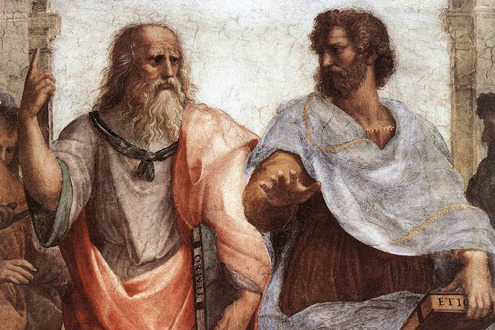
“…and every revival only births a perversion of the original, and yet a return to form and renewal of the mission. Wilbur brought back to ambition, Tommy to fear, Techno to anarchy. This is because they were not properly revived through holy means, instead in symbols associated with satanic imagery; a grimoire, a totem. The revival book’s association with Dream echos ideas of Satan offering power that ultimately corrupts. Other symbols of Christianity show up beyond souls, revival, and satanic imagery, likewise tied to Dream. In the garden of Eden—”
“Golden apple as a symbol of the temptation of power! Of course of course! Knowledge as power, the fall of man from grace. This shows particular on the summit meeting between Techno and Dream, wherein a god apple is given by Dream. This falls neatly into parallel with Eden, where Eve is lured with the promise of having the same wisdom and thus power as god. It is the temptation presented, power promised in the same breath as suffering and conflict…”
#Imma be real I fixated on the characters and not the lore so much but I am so down bc I love silly literary analysis#Crap now I’m thinking of exodus/pogtopia parallels#Trying to find a way to work in cannanite>cain as a symbol of farming v animal husbandry. Brothers. Betrayal. Techno>plants tomy>animal-pet#Aw hell#Apparently I have thoughts about this#Anyway totally down to discuss stuff though warning I’ll probably mess up details bc it’s been awhile#Angel of death Phil…I have Thoughts for you……..#Dsmp#dsmp analysis#dream smp#c!tommy#c!wilbur#c!techno#c!dream#mcyt#dsmp meme#tw christianity#christian imagery#something to nom on
31 notes
·
View notes
Text
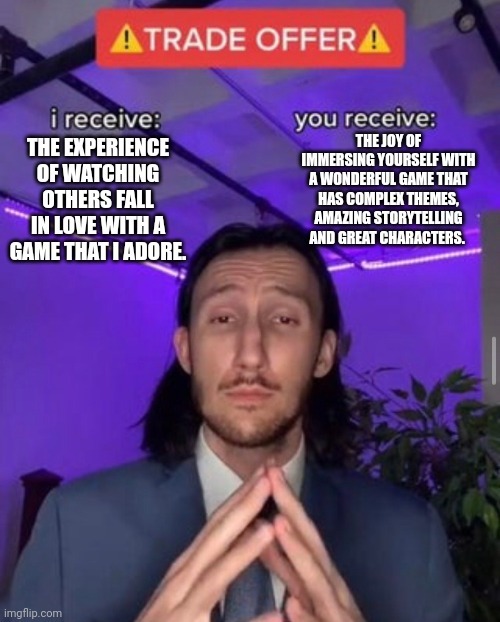
This is me suggesting small streamers to play Disco Elysium btw.
#never get me twisted#i may be terrified of big streamers playing this game cuz of influx of people who lack literary analysis skills coming into fandom spaces#but i LOVE LOVE LOVE watching small creators just enjoying the game to enjoy it#at lot of the time there isnt the pressure to entertain as much as u watch this stranger fall in love with the same media u love#GOD it's so fun#just wonderful#disco elysium
50 notes
·
View notes
Text
i love meta i love picking apart the narrative im clawing open the cage of the narrative im getting my favourite characters out and then unfortunately for them im putting them right back in after im done with playing with them so i can watch them run around for a little longer in there
#i think i understand why i like my literary analysis course so much now. i go to The Narrative dot com#personal
77 notes
·
View notes
Text
King Of Fools
Throughout my analysis of The Owl House, you might have noticed that I have been largely focusing on Luz and co., with Eda sometimes gaining the limelight. With a few exceptions, I have mostly glossed over King's storyline, because it has mostly been comedy relief that plays offhandedly into the themes of the story.
But King is a fascinating character, and a complex one. And even in his previous focus episodes, he has been portrayed as relatively flat. He likes conquest and violence, that's pretty much it. So where did that change?
I would argue that King's character development and complexifying began in Really Small Problems.
Let me explain.
SPOILERS AHEAD
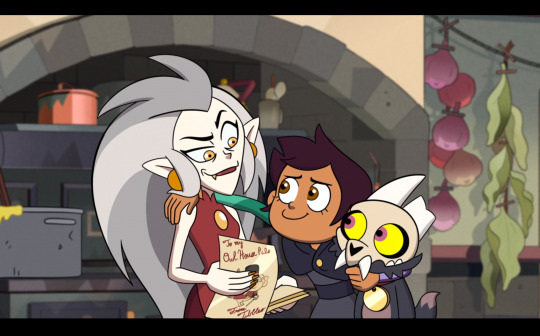
This episode fleshes King out by making him simpler, at least in motivation. Here, King's ambitiousness and world conquering nature shift slightly. We are introduced to a fundamentally petty character, and that's not a bad thing, most of the time. He just wants attention.
Now, pettiness is a focus on the small things in life, and that's what King does. He fixates on the little things and causes problems because of it. You might say that he has Really Small Problems. Maybe.
But there is a negative connotation to the word "petty". It's the reason it gets used as an insult, and that's because there is an obsessive element to it and a selfish element. Not malicious, but problematic, which can sometimes cause conflict.
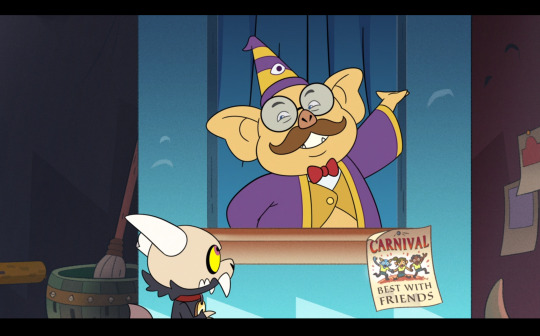
For an example of why this causes issues, take the antagonist of this episode, one Tibblet-Tibblie Grimm Hammer III (TTGH3, I refuse to call this man "Tibbles"). I think that TTGH3 and King are rather similar characters, and it is this that causes character development in king.
Because King is petty. He is obsessive, and selfish, at the start of the episode. And he doesn't stop being those things at the end of the episode, or even at the end of the series, he just matures. He learns in which situations that selfishness is perfectly fine, and in what situation it isn't.
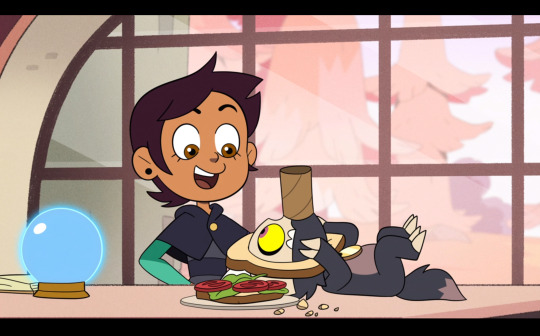
This episode opens with a quick briefing of King's character. Luz has been talking with friends, and King wants attention, so he makes a fool out of himself, and this reframes his actions in previous episodes. Suddenly the comedic antics become attempts for that same attention, and we see how that causes problems in retrospect.
King's goals have been simplified from conquer and rule the world to "notice me" and the complexity is derived from how that goal, despite being much more achievable, gets brought into conflict with other people.

That is actually a summary of the plot as well. King sees Luz spending time with her friends without him, and he makes a fool out of himself trying to get her back. He gets tricked by TTGH3 into making everyone tiny, and directly causes problems.

The symbolism of that friendship bracelet is rather cool, actually. King values it more than anything else, specifically its exclusivity. But when he realises his mistake, his way of remedying the problem is breaking it, shattering the symbol of his obsession, but also breaking it into more pieces. The same heart can be shared between more people.
I am also ninety percent sure that the carnival setting of this episode just exists for that hall of mirrors so that the metaphor of distorted perceptions could be hammered home.

TTGH3 doesn't learn this lesson at all, because he is a mirror of King (more mirror symbolism). TTGH3 is what happens if King continues on his current path, going against his friends and being possessive over them. Reducing them to items he can keep in a box.
But King's pettiness isn't a bad thing. Not exclusively. He is the perfect foil of Luz, and of Bellos, and of the Collector later on down the line (but we will talk about that when we get there). And that specifically ties into his role as the fool.

History Collection has an article about the history of the fool, and the thing I find fascinating is the duality of the character. This was the only person who could mock the king without losing their head, and served a myriad of roles (including sometimes as an assassin) because they were trusted and underestimated. The fool was an eejit who you didn't need to worry about because they were joking, but they were often the most astute person in the court.
The fool made people laugh, and I think that is important. Laughter is a primarily selfish emotion. You disrupt others because you are enjoying yourself, but it isn't maligned. It is encouraged. King straight up references tropes of being a comedian, a role directly descended from the fool.

If we return to the mirror symbolism, King is a mirror of both Luz and Bellos, but in the opposite ways. Luz enters the story wanting a worldly adventure and to save the world, and she gets those things, but she has to learn that it is the small things that matter just as much. Luz has to learn to see the world the way it is, and King's arc mirrors that, but with how he sees himself.
King begins the story wanting to rule the world, and the single best piece of catharsis in the entire series is a photo on a wall in the last episode depicting King playing catch with Eda. It's ok to want the small things, its ok to not know what you want. And its ok to be a bit selfish sometimes. Sometimes you want to laugh, sometimes you need to do your own thing. But you need to understand where that comes into conflict with others, and you need to understand how to take care of yourself and those others.
Maybe it's not selfish or petty, maybe I'm getting the words wrong (language is weird), but the point still stands.
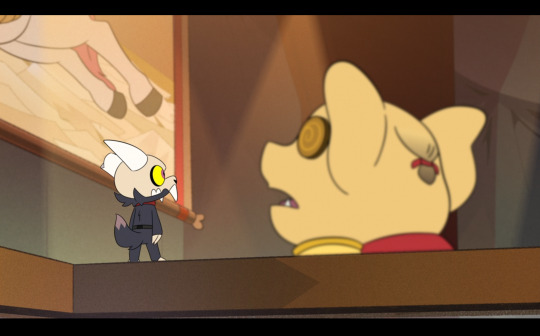
But King is also a direct foil of Bellos. Starting with the obvious of both referring to themselves with titles, King and Emperor. But the contrast between the two is important. Bellos began his own story thinking on an incredibly small level, to the point where his own obsession over it killed his brother, but then Bellos decided he wanted to rule the world. He sacrificed his family for rulership.
King forsakes ruling for (found) family. As later reveals show him to be a titan, and associated with connection and nature, it would seem that Bellos is in opposition to the Boiling Isles as a whole. Not just practically but ideology.
The fool criticises the king. King criticises the Emperor. Fitting, in a weird way.
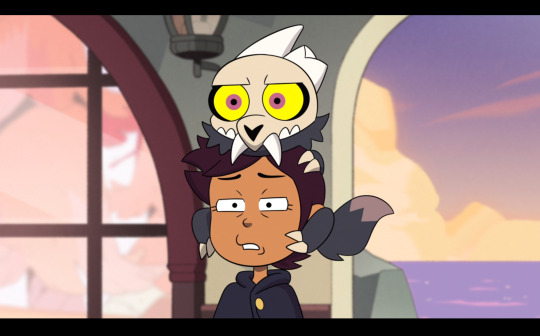
Final Thoughts
I like King. Tropes often get a bad rap, but they can be used effectively, and one that I will faun over every time is the comic relief that very suddenly turns dramatic. Like King later on down the line, but also like the finale of God Of War: Ragnarök. If you know, you know.
Next week, I'm taking a look at Understanding Willow, and there is a lot to talk about there, so stick around if that interests you.
Previous - Next
#rants#literary analysis#literature analysis#character analysis#what's so special about...?#the owl house#toh#toh king#owl house#king clawthorne#TTGH3#Tibblet-Tibblie Grimm Hammer III#I hate TTGH3 so much
20 notes
·
View notes
Text
His name isn’t Montrose.
It can’t be. He throws himself into every role he can for the heist, slipping into the skin of a persona and settling in like its second nature. Names have been a long running TAZ theme, but Steeplechase has an extra layer to that. The idea of actors lost in their roles is intrinsically tied into the world of Dentonic. Roleplay within roleplay, and they keep making jokes about how many levels of acting they’re on, but how far does it go? Goodparty -because that’s the one truth I think he has- wears so many faces except his own, and I just cannot believe Montrose is any more real than the rest of them. Masks and names and roles. A world designed to perfection for escaping, hardlight blurring the lines of reality even further until they break. I think he’s lost himself in the performance.
#montrose pretty#taz#taz steeplechase#steeplechase#taz theory#the adventure zone#Like I don’t think this is a hot take#But I love so much the themes being incorporated into the current arc#Mmmmm literary analysis on dnd podcasts#something to nom on
71 notes
·
View notes
Text
the self-identified devil’s advocate in my class went on a rant about how oscar wilde’s aestheticism/art for art’s sake is amoral bullshit, which i think is ironic given that ten minutes earlier she was talking about how much she hates literary criticism and thinks we should be allowed to like a poem just for the pleasure that reading it brings without having to look for what it “means.” however i find consolation in telling myself that this is better than the class where three girls started writing poe/whitman/wilde gay fanfic in the zoom chat
#sorry for complaining so much about this class i just feel like i’m in the twilight zone for so much of it#anyways this lady doesn’t even know that literary analysis is how you straddle a piece of art’s lap and make out with it sloppy style#ryddles
49 notes
·
View notes
Text
Th' stereotype that autistic people like numbers was always one I was like "oh! not me though haha. Cuz we are normal"
In 4-5 grade all I would write were Haikus. I wrote hundreds of them for my classes and I would share them when we shared our work. My teacher was super positive about nurturing this in me and I loved counting out syllables and following the rigidness of writing them.
I've been thinking about this a lot lately
#elias howls#Little literature boy strikes again. I started to say I hated poems because that's what everyone else around me did at a certain age (and i#had to fit in) BUT I DON'T!!!!!! I'VE NEVER HATED POETRY!!!!! I LOVE IT!!!!!!!!! I LOVE COUNTING STANZAS AND LISTING OUT RHYMING SCHEMES AND#I LOVE LITERARY ANALYSIS ESPECIALLY WITH POEMS BECAUSE TWO PEOPLE CAN TAKE TWO VERY DIFFERENT IDEAS/MORALS/END FROM POEMS. GRRRRGRUAGH I W#ISH I COULD GO BACK TO ANALYSIS. I HAVE SO MUCH PASSION FOR READING AND DISCUSSION AND LITERATURE. FUCK!!!!!!!!!!
16 notes
·
View notes
Note
Just out of curiosity, why did you decide to write A Flair of Fate as a comic, rather than prose?
Hi!
So this is actually a really complicated answer, but I'm gonna try to break it down into the key points.
A Flair of Fate is largely in conversation with shounen anime, so I wanted it to be in a medium that would allow it to embody the tropes it deploys, but also where it could be in open conversation with similar stories.
Prose is a really limited medium in a couple of different ways. It's hard to have really large casts in prose novels because it's hard for people to remember all of the characters when all you have is a name to remember them by, and bc prose typically follows a limited number of POVs, you can only keep up with so many characters in their own time, plus you're limited to only seeing that which your POV characters see/know. In a Flair of Fate, this would be a major issue because Javi is a REALLY unreliable narrator. [Mild spoilers to follow], BUT a recurring theme in this comic is normalizing things that are NOT normal. One example is here in the prologue:
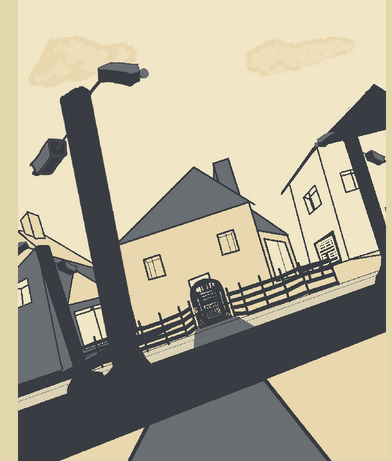
This is just an establishing shot of Javi's best friend's house, but there are all these security cameras everywhere. They live in a dystopian police state, where there's hyper-vigilance, but that's normal to them, so if we were navigating all of this through Javi's head, it would be a lot harder to drop these details that he genuinely doesn't notice. Visually, I can establish these subtle cues throughout as the story builds, which is really important because this story has A LOT to explore that Javi is oblivious to at the beginning LOL.
3. The story is long form, kind of like old TV used to be, in that it's one long story that can be divided into arcs or seasons, but the big villain is consistent until we finally confront them at the end. In prose novels, each book is supposed to be able to stand [mostly] on it's own, with a full plot arc per installment, and that would absolutely not work for this story!
4. The fluidity of an illustrated medium detaches readers from a tendency to take things too seriously or too literally. It adds a sort of inherent humor that allows stories like, say, Avatar the Last Airbender, which deals with war and genocide, to still be incredibly light-hearted and funny most of the time. This was super pivotal for this story too because it does have some really dark moments and some very heavy plotlines. It's a dystopian, anticapitalist story at it's core, BUT most of it is a sort of slap-stick humor/friendship/romance story about all the shenanigans that go down in this superhero sports league, so being able to manipulate the tone of a scene through the artwork makes a HUGE difference!
Ex:
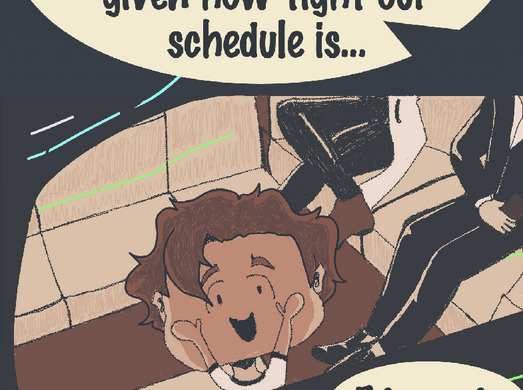
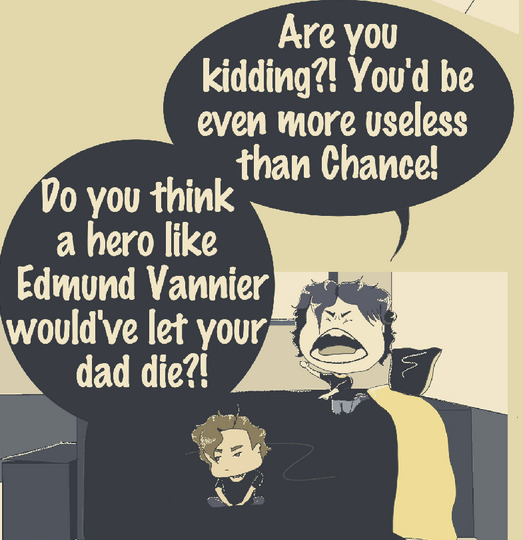
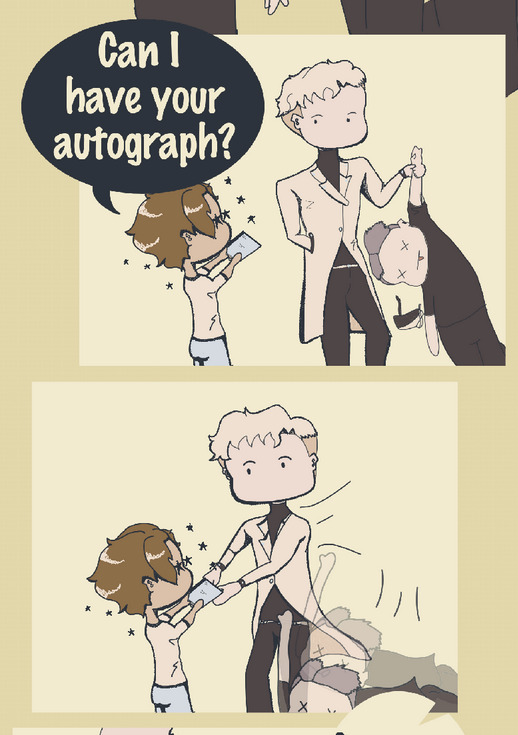
5. And the last big reason is because I have ADHD and reading prose sometimes can feel kind of insurmountable, but the bite-size, visual heavy chunks of webcomic format gives my brain the happy hum feeling, so when I decided that I wanted to tell as story that would embody everything *I* the fanboi would want in a story, I realized it only made sense to let it be a webcomic!
Anyway, thanks for asking! Sorry this was the longest response ever LOL
#I love this story a little too much so I could talk about it for days LOL#Asks#A Flair of Fate#webcomics vs prose#literary analysis#media analysis
7 notes
·
View notes